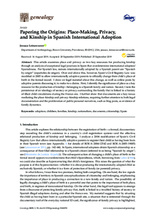Displaying 131 - 140 of 623
This article presents a case study of a 15-year-old boy whose severe difficulties were understood and formulated in terms of ‘attachment problems’ for many years.
This country care review includes the Concluding Observations of the Committee on the Rights of the Child and the Committee on the Rights of Persons with Disabilities. The Committees' recommendations on the issue of Family Environment and Alternative Care, and other care relevant issues, are highlighted.
This article examines place and privacy as two key resources for producing kinship through an analysis of exceptional legal practices in Spain that overdetermine international adoptees’ Spanishness.
This country care review includes the care related Concluding Observations adopted by the Committee on the Rights of the Child and the Committee on the Rights of Persons with Disabilities as part of the Committees' examinations of the periodic reports of India.
This country care review includes the Concluding Observations for the Committee on the Rights of the Child and the Committee on the Rights of Persons with Disabilities adopted as part of the Committees' examinations of Greece’s reports, as well as other care-related concluding observations, ratification dates, and links to the Universal Periodic Review and Hague Intercountry Adoption Country Profile.
The aim of this module from the book Rights-based Integrated Child Protection Service Delivery Systems is to learn to place children in specific alternative childcare services.
The objective of this study was to compare the outcomes for the Neuro-Physiological Psychotherapy (NPP) intervention group to those of a control group.
This chapter argues that poverty per se should never constitute the basis for removing children from their parents and seeks to understand the British situation, in order to see how poverty is treated in relation to child welfare in Britain.
This study from Innovative Issues and Approaches in Social Sciences examined perceptions and practices of domestic adoption in Adama City in Oromia/Ethiopia. The study reveals that people’s perception towards adoption practice, adoptive parents and children is mixed; it could be positive and encouraging or negative and discouraging.
Part of the 'Permanently Progressing? Building secure futures for children in Scotland' study, this briefing draws upon the voices of children, carers and adoptive parents in Scotland, offering perspectives on kinship care, foster care and adoption.






